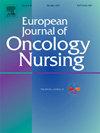检查个人慢性血液恶性肿瘤护理人员的心理社会脆弱性:横断面调查。
IF 2.7
3区 医学
Q1 NURSING
引用次数: 0
摘要
目的:调查慢性血液肿瘤患者非正规照顾者的社会心理脆弱性,并确定慢性血液恶性肿瘤患者(CHM)照顾者的社会心理脆弱性水平:这是一项国际横断面研究,研究对象包括来自爱尔兰(29 人)、澳大利亚(21 人)、英国(4 人)、美国(4 人)和印度(6 人)的慢性血液恶性肿瘤患者护理者(64 人)。照护者使用加州大学洛杉矶分校孤独感量表、简明复原力量表、感知压力量表和修正照护者压力指数量表完成孤独感、复原力、压力和照护者压力的量表。研究采用了描述性统计和非参数技术:结果显示,较年轻的照顾者(18 至 40 岁)报告的孤独感、压力和照顾者压力水平较高。因照顾他人而离开有偿工作岗位并领取照顾者津贴或社会福利的照顾者的孤独感和照顾者压力水平较高。而接受有偿专业护理支持的照顾者的压力水平较低。最后,照护者较高程度的孤独感与患者目前正在接受某种形式的治疗有关,而照护者较高程度的压力则与每天照护患者超过 8 小时以及患者的社会、精神和经济生活都受到影响有关:结论:慢性血液肿瘤患者的照顾者在心理社会方面很脆弱,这与他们的年龄、社会经济地位、性别以及健康和福利有关。本文章由计算机程序翻译,如有差异,请以英文原文为准。
Examining psychosocial vulnerability in caregivers of individuals with a chronic haematological malignancy: A cross sectional survey
Purpose
To investigate psychosocial vulnerability in informal caregivers of chronic haematological cancer patients and determine the level of psychosocial vulnerability among carers of people living with a chronic haematological malignancy (CHM).
Methods
An international cross – sectional study including caregivers of individuals with a chronic haematological cancer (n = 64) from Ireland (n = 29), Australia (n = 21), the UK (n = 4), the USA (n = 4), and India (n = 6). Caregivers completed scales for loneliness, resilience, stress and caregiver strain using the UCLA Loneliness scale, Brief Resilience scale, Perceived Stress scale and Modified Caregiver Strain Index scale. Descriptive statistics and non-parametric techniques were used.
Results
The results show that younger carers (aged between 18 and 40) report higher levels of loneliness, stress and caregiver strain. Carers who have left their paid employment due to caregiving and are in receipt of carers’ allowance or social welfare report high levels of loneliness and caregiver strain. Lower stress levels were reported in those who received paid professional caring support. Finally, higher levels of loneliness in carers were associated with the patient currently being on some form of treatment and higher levels of caregiver strain were associated with caring for someone for more than 8 h per day and having all social, mental, and financial areas of life affected.
Conclusion
Caregivers of patients with chronic haematological cancers experience psychosocial vulnerability, which is associated with their age, socioeconomic status, gender and health and wellbeing.
求助全文
通过发布文献求助,成功后即可免费获取论文全文。
去求助
来源期刊
CiteScore
4.40
自引率
3.60%
发文量
109
审稿时长
57 days
期刊介绍:
The European Journal of Oncology Nursing is an international journal which publishes research of direct relevance to patient care, nurse education, management and policy development. EJON is proud to be the official journal of the European Oncology Nursing Society.
The journal publishes the following types of papers:
• Original research articles
• Review articles

 求助内容:
求助内容: 应助结果提醒方式:
应助结果提醒方式:


